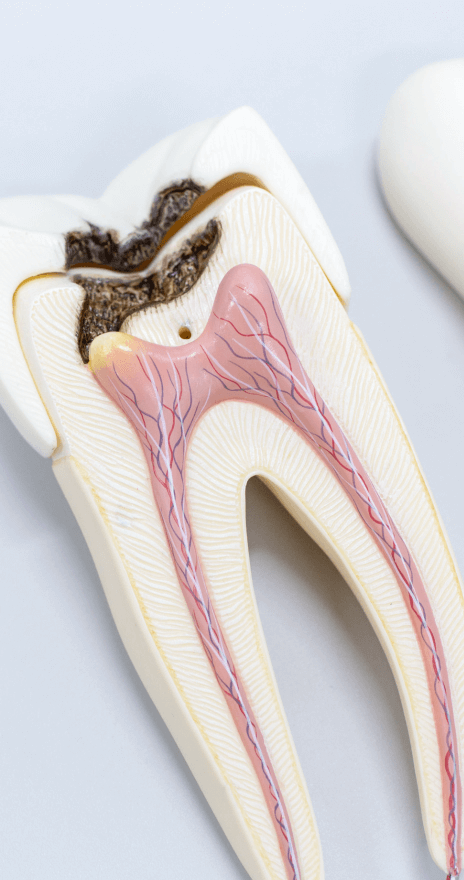A root canal is recommended when a badly damaged or infected tooth is in need of repair. This treatment saves the natural tooth and avoids extraction. The procedure involves removing the damaged area of the tooth (the pulp or nerve), cleaning and disinfecting it, and then filling and sealing it.


The term “root canal” comes from cleaning of the canals inside the tooth’s root where the tooth’s nerve and blood vessels can be found, where they extend from the crown to the tip of the root. Most of the time, the root canal is completed in one appointment. However, if the tooth is infected, two or more appointments might be required.
Many patients are concerned about root canal treatments being painful. Rest assured that dental advancements have made this procedure smooth and uncomplicated. Local anesthesia (freezing) will be administered before the root canal to make treatment painless. While there may be some discomfort for a brief period after treatment, this can be controlled with anti-inflammatory medication like Advil (Ibuprofen).
Root canal therapy is an indispensable procedure in treatment of teeth that are severely decayed, infected, or broken. Some symptoms that can indicate a patient needs a root canal is when the tooth:
Sometimes the pulp of the tooth will die without causing any noticeable pain. Other times the pain could be very intense, sharp, or throbbing even to the point of keeping you up at night. Some patients experience face swelling and discomfort. Dr. Newman will take an X-ray and test your tooth to establish a diagnosis before commencing any treatment.

After the canals are filled and sealed, a filling will be placed in the coronal part of the tooth. Antibiotics are prescribed in case of an infection and we always recommend anti-inflammatory medication like Advil (Ibuprofen) to minimize the pain and inflammation that occurs after the treatment. A post is sometimes necessary to reinforce the remaining tooth structure and crowns are recommended on posterior teeth to prevent catastrophic fractures from biting.
Root canal therapy can maintain your tooth’s life for many years, saving it from extraction. The success rate of a root canal treatment is about 95%, depending on the patient’s health condition, health of the gum and bone supporting the tooth, the amount of tooth structure left after decay is cleaned up, the presence of fracture lines in the tooth, and the complexity of the anatomy of the roots and canals inside them.
